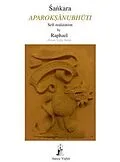Aparok anubuthi belongs to the series of works by äkara known as prakaräagrantha, i.e., "specific treaties" in verse and prose concerning basic points of the Vedanta teaching that examine the "great sentences" (mahavakya) contained in the Upani ads. In this series of treaties by äkara, other works fundamental for the understanding of the Advaita-vada or the "path of Non-duality" include Vivekacüamani, Atmabodha, Upadesasahasri and Laghuvakyav tti.
Aparok anubuthi means "direct perception or knowledge of the Self," and, by extension, the action or practice actualized to realize oneself as atman-Self, thus "Self-realization."
To realize means to "translate into reality," which implies bringing into actuality that which is virtual, manifesting something that already exists.
That one who wants to find the "fullness" and the "beatitude" of Being must simply rediscover himself, must capture his own true and profound nature and ardently realize it. This does not mean "rejecting" life, "opposing" the sphere of perishable things, "abandoning" the world, rather, it means comprehending what one is, and resolving what one is not. "Tat tvam asi: That thou art", to which Säkara refers in his is sutras, is the "great sentence" (mahavakya) that corresponds to the highest possible attainment and that Advaita Vedanta propounds for those individuals who are in conflict as their true nature has been "forgotten."
To achieve this Comprehension-realization, Aparok anubuthi presents fifteen steps or means (some of which are also found in Yogadarsana or Rajayoga of Patañjali) focusing especially on vicara-discrimination or discernment. Vicara is a method of philosophical inquiry, a process of pure searching for the universals, but, unlike what one may think, this method is "experimental"; it is not a mental process for constructing a theory of knowledge or of reality, rather, it leads to the direct experience of Reality.
Because Aparok anubuti is based on jñana Realization (Knowledge), a text that appears as Säkara's Preface to the Svetasvatara Upani ad has been included in the appendix because it promotes the right consciential position for one who wants to walk the "Path of Knowledge."
The translation and commentary by Raphael adhere to the Advaita Tradition and offer a conceptual methodology appropriate to the Western mind, moreover, they adequately and properly stimulate the reader's consciousness to living a real metaphysical life.
Autorentext
RAPHAEL is an author and a Master in the Western Metaphysical Tradition as well as the Vedanta. For over 35 years, he has written several books on the pathway of Non-duality (Advaita). He has also translated and commented a number of key Vedanta texts from the original Sanskrit. His entire work is a conscious reunification of Western and Eastern Traditions into Unity of Tradition. Founder of the Asram Vidya Order, after more than 60 years of teaching, both oral and written, Raphael has withdrawn into the mahasamadhi.
